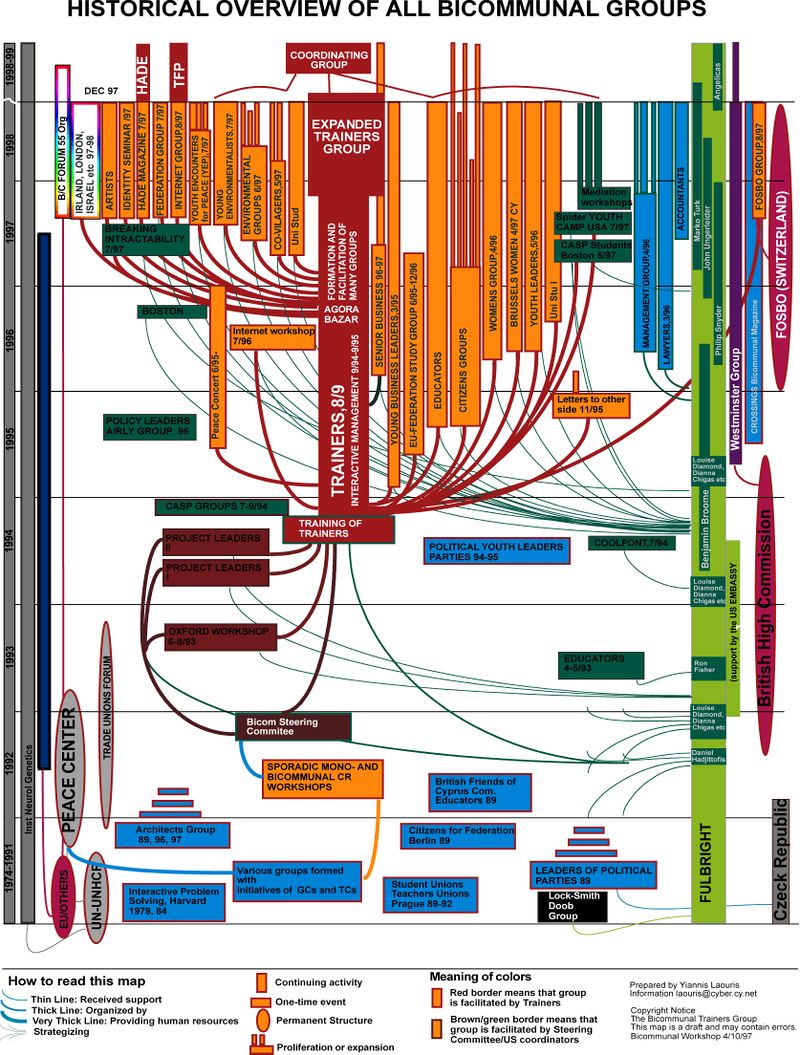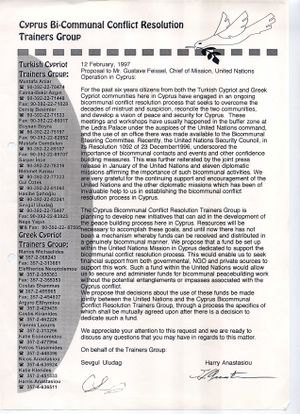Cyprus Conflict Resolution Trainers Group
It was created by members of the Bicommunal Conflict Resolution Group (Project Leaders I), the Bicommunal Conflict Resolution Group (Project Leaders II) and the Bicommunal Steering Committee.
Early Peace Movement
The members of the Cyprus Conflict Resolution Trainers Group are credited for the creation and growth of what later became known as peace movement in Cyprus, having introduced and trained more than a few thousand citizens from across the enemy borders in peace and conflict resolution. The map below summarizes all peace groups and initiatives in Cyprus, especially up to their abrupt discontinuation in December 1997 by Turkey. The orange boxes show all groups created and supported by the Cyprus Conflict Resolution Trainers Group.
Cyprus Peace Bazaar
In the third phase of their work, the CCRTG proposed a total of 241 possible projects designed to work toward their vision, and they eventually selected 15 of these projects (using democratic structured dialogue) for implementation during the following year. On June 24, 1995 they held an Agora/Bazaar in the premises of Ledra Palace to which they invited others who had expressed interest in joining them in peace building efforts.[1]
Selected projects
| # | PROJECT |
| 1 | Form study groups on Cyprus Federation/EU |
| 2 | Establish regular columns in G/C and T/C newspapers by members of opposite community |
| 3 | Schedule series of lectures by Orthodox and Muslim priests |
| 4 | Establish bi-communal meetings for T/Cs and G/Cs who studied together in integrated schools before 1974 (English School and American Academy) |
| 5 | Find sponsors for publishing books on poetry, short stories, art, folk dances in both languages |
| 6 | Establish a bi-communal women’s research center and support group |
| 7 | Form a bi-communal research center on history, social structure, traditions, culture, oral history of the two communities |
| 8 | Conduct bi-communal workshops for young political leaders |
| 9 | Establish bi-communal center to teach Internet and Greek and Turkish languages |
| 10 | Organize bi-communal workshops on problem solving techniques for educationalists |
| 11 | Set up bi-communal training/research center on conflict resolution and problem solving |
| 12 | Create bi-communal dialogue groups to focus on critical issues (property concerns, identity, security, etc.) |
| 13 | Organize poetry evenings for bi-communal audience |
| 14 | Organize concert with theme Peace on the Green line |
| 15 | Study the living conditions of T/Cs who live in the south and G/Cs who live in the north and make joint public report |
Implementation
The Group has sent a historical letter sent to UN General Secretary 12 Feb 1997 by which they were requesting logistical and financial support to implement their projects. Almost three years later, the UN established the Cyprus wing of the UNOPS program, which provided funding for some of the above projects, but mainly to a few a hundred additional peace initiatives on the island. The UNOPS program failed in many respects to support the continuation of the work of the Cyprus Conflict Resolution Trainers Group because it came late.
Videos
Canan Oztoprak & Katie Clerides
Costas Kyranides & Huseyin Gursan
Dervish Baha & Katie Economidou
Sarper Ince & Mustafa Damdelen
Members
- Harry Anastasiou
- Nicos Anastasiou
- Mustafa Anlar
- Fatma Azgin
- Bekir Azgin
- Dervish Besimler
- Irfan Beyatli
- Boysan Boyra
- Katie Clerides
- Mustafa Damdelen
- Katie Economidou
- Argyro Efthimiou
- Huseyin Gursan
- Maria Hadjipavlou
- Sophocles Hadjisophocleos
- Sarper Ince
- Mehmet Kansu
- Merope Kapsali
- Costis Kyranides
- Yiannis Laouris
- Marios Michaelides
- Dina Mousteri
- Eleftherios Neoptolemou
- Gul Oztek
- Hasibe Sahoglu
- Seda Selcuk
- Costas Shammas
- Sevgul Uludag
- Neshe Yasin
- Petros Yiasemides
References
- ↑ The Cyprus Conflict: Root Causes and Implications for Peacebuilding Journal of Peace Research May 1, 2007 44: 349-365

